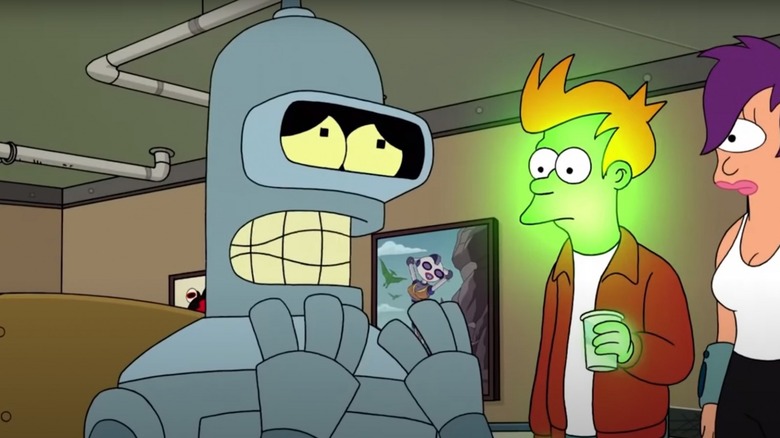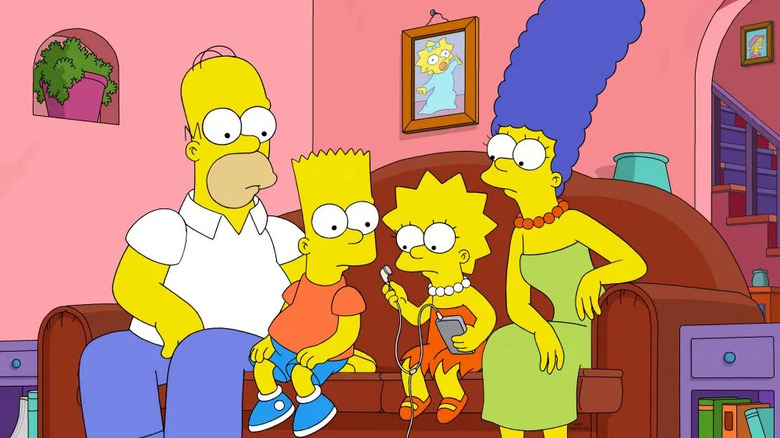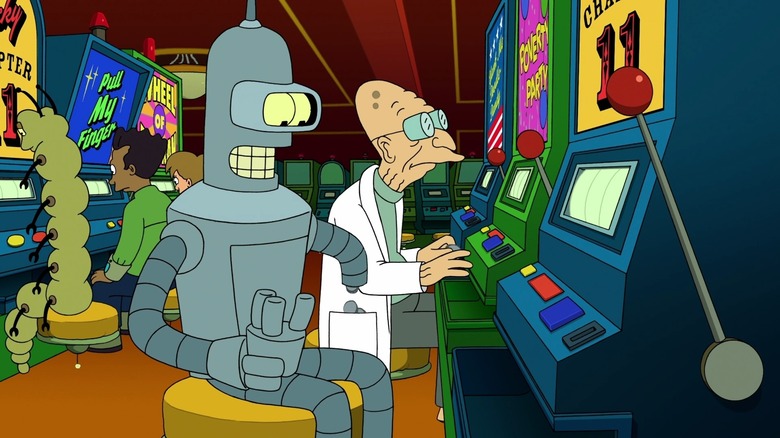Matt Groening Thinks Futurama Is More 'Real' Than The Simpsons
In "A Big Piece of Garbage," the eighth episode of "Futurama" (first aired on May 11, 1999), it was revealed that 20th-century Earth solved its overflowing landfill problem by balling up all the world's trash, attaching it to a high-powered rocket, and launching it into space. It turns out this was only a temporary fix, as, thanks to the gravitational caprices of comets, the big ball of garbage returned to Earth a millennium later. In order to investigate the returning garbage ball, Fry (Billy West), Leela (Katey Sagal), and the robot Bender (John DiMaggio) must walk across its surface in space suits. They come across a large pile of 1990s junk, including a "Star Trek" collector's plate, a Beanie Baby, and a large pile of Bart Simpson dolls.
This was a shocking moment. The appearance of Bart Simpson dolls means that "The Simpsons" was, in the universe of "Futurama," merely a TV show. "Futurama" and "The Simpsons" were both created by comics and TV guru Matt Groening, and those dolls were, it turns out, something of a declarative statement from Groening and his "Futurama" co-creator David X. Cohen. As Groening said explicitly in a 2013 interview with the Los Angeles Times, "I always say that 'Futurama' is real, and 'The Simpsons' is fiction."
Groening expanded on that idea by saying that "The Simpsons" was always firmly rooted in old-fashioned, fictional sitcom tropes, whereas "Futurama" actually addresses the passage of time. Hence, "Futurama" was the more realistic show.
The early days of the Simpsons
In the first few seasons of "The Simpsons," the family dynamic was less a decades-long absurdist media experiment and more of a mildly self-aware animated sendup of "The Adventures of Ozzie and Harriet"-style sitcoms. "The Simpsons" was always a deconstructionist effort, but the characters were meant to read as low-class satires of the ordinarily placid suburban bliss typically seen on American television. Homer, for instance, was obsessed with making ends meet and ensuring that his family be read as "normal." That sitcom setup eventually fell away, and as "The Simpsons" drifted from reality, it got closer to TV greatness. As Groening explained:
"With 'The Simpsons' they used to worry about money — the characters were scrimping to get by, and Homer actually had to get up in the morning and go to work. And now he's wherever we want him to be for whatever reason at any time. Occasionally we make a joke that he's missing work, but often he's wandering around like Ozzie. And I think that that was one of the reasons for the success of the show, because it was such a traditional sitcom template of the family, so you know where the kids are supposed to be in the morning — eating breakfast, catching the school bus, going to school — and where Homer was, at work, and Marge raising Maggie at home."
Clearly Groening hit on a good character dynamic, as the show was recently renewed for a 34th season. One more year and "The Simpsons" can run for president.
Old Homer in 1991 vs. Young Homer in 1995
A key difference between "The Simpsons" and "Futurama" is the treatment of time. Despite having been on the air for over three decades, Bart Simpson has never had a birthday; he is eternally 10. Lisa is eternally 7. Maggie will always be a baby. This refusal to let the Simpsons age has made for some amusing slippages in their history. In an early episode called "The Way We Was," first aired in 1991, a teenage Homer (Dan Castellaneta) and a teenage Marge (Julie Kavner) are seen meeting for the first time in 1974. Later, in the 2008 episode "That '90s Show," a new flashback insinuates that Homer, still a young man, was in a grunge band called Sadgasm ... in 1995.
"Futurama," in contrast, notes the passing years, having a definite calendar starting point in the show's pilot. Groening explained that "'Futurama' started with Fry getting frozen on New Year's Eve 1999 and waking up 1,000 years later, and then as it's gone forward in time, we're in 3013 now. And on the other hand, the characters haven't aged!"
This is only partly true. While Fry still appears to be in his mid-20s throughout the series, Prof. Farnsworth (also voiced by Billy West) continues his steady march into extreme old age: By last count he was 181. However loose "Futurama" may be with characters' ages, it treats time more realistically than the loosey-goosey, non-aging chronology of "The Simpsons." Perhaps not coincidentally, "Futurama" is the show which has several times accurately predicted the future.
"Futurama" is available on Hulu, with new episodes coming in 2023. "The Simpsons" — whose production crew has recently unionized – is available on Disney+, with new episodes coming until the end of time.


